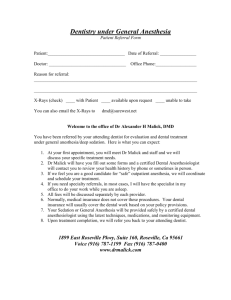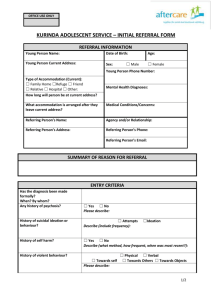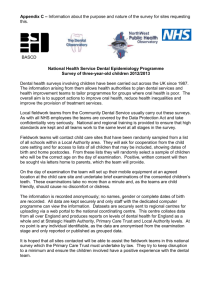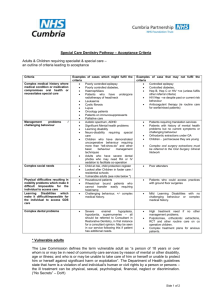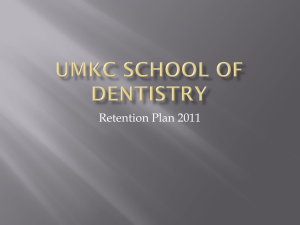Referral Guidelines for General Practitioners
advertisement
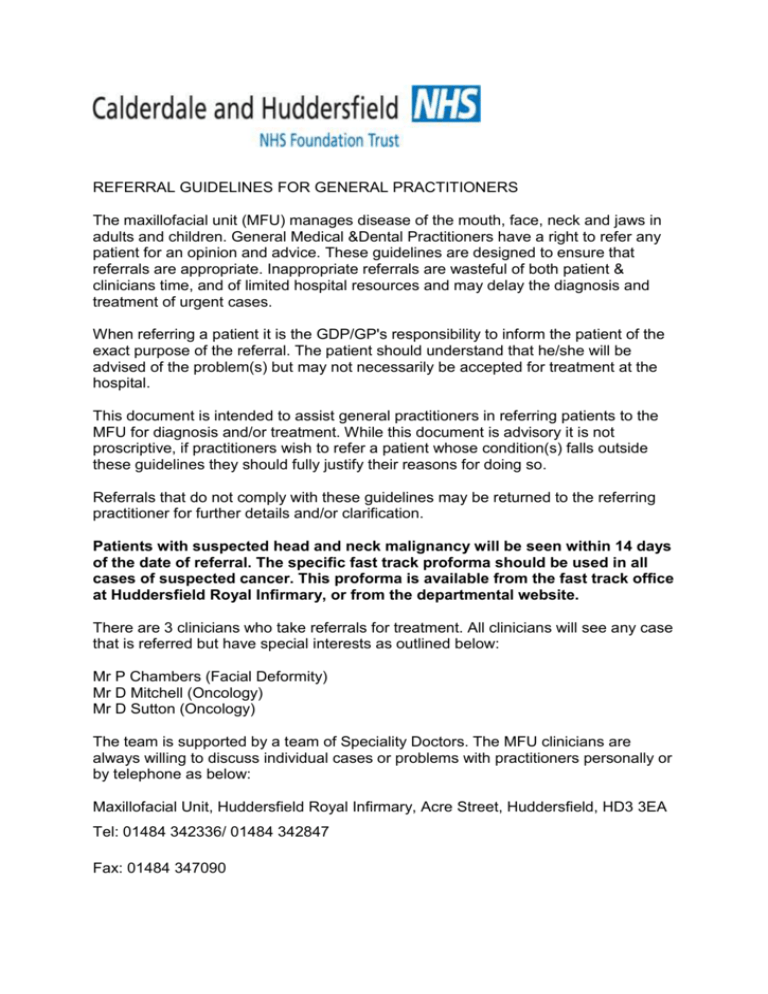
REFERRAL GUIDELINES FOR GENERAL PRACTITIONERS The maxillofacial unit (MFU) manages disease of the mouth, face, neck and jaws in adults and children. General Medical &Dental Practitioners have a right to refer any patient for an opinion and advice. These guidelines are designed to ensure that referrals are appropriate. Inappropriate referrals are wasteful of both patient & clinicians time, and of limited hospital resources and may delay the diagnosis and treatment of urgent cases. When referring a patient it is the GDP/GP's responsibility to inform the patient of the exact purpose of the referral. The patient should understand that he/she will be advised of the problem(s) but may not necessarily be accepted for treatment at the hospital. This document is intended to assist general practitioners in referring patients to the MFU for diagnosis and/or treatment. While this document is advisory it is not proscriptive, if practitioners wish to refer a patient whose condition(s) falls outside these guidelines they should fully justify their reasons for doing so. Referrals that do not comply with these guidelines may be returned to the referring practitioner for further details and/or clarification. Patients with suspected head and neck malignancy will be seen within 14 days of the date of referral. The specific fast track proforma should be used in all cases of suspected cancer. This proforma is available from the fast track office at Huddersfield Royal Infirmary, or from the departmental website. There are 3 clinicians who take referrals for treatment. All clinicians will see any case that is referred but have special interests as outlined below: Mr P Chambers (Facial Deformity) Mr D Mitchell (Oncology) Mr D Sutton (Oncology) The team is supported by a team of Speciality Doctors. The MFU clinicians are always willing to discuss individual cases or problems with practitioners personally or by telephone as below: Maxillofacial Unit, Huddersfield Royal Infirmary, Acre Street, Huddersfield, HD3 3EA Tel: 01484 342336/ 01484 342847 Fax: 01484 347090 Secretaries: 01484 342336/01484 342847 SUBMITTING REFERRALS TO THE MAXILLOFACIAL UNIT Patient Details Please ensure the correct patient demographics/ contact details are provided, please include the patients NHS number if possible. If an interpreter is necessary please clearly indicate this, including the required language If Patient transport is required this should be stated in the referral letter Referrals should be typed or word processed to aid legibility and avoid confusion Referrals should be signed personally by the referring practitioner and not by a deputy Clinical Details The practitioner should clearly state the reason for referral and what s/he is requesting the MFU to do for his/her patient, stating the level of urgency All relevant details concerning the patients’ dental, medical and social history and current complaint should be recorded in order to assist the MFU in appropriately prioritising the degree of urgency Acute facial trauma and severe pain should be discussed via a telephone call with the on-call team Apical Surgery: See separate guidance Wisdom Teeth: Referrals should comply with the NICE or SIGN third molar guidelines;Copies of these guidelines are readily available on line TMJ disorders: Referrals should comply with the BAOMS/RCS guidelines: Consideration should be given to referring a patient with TM joint disorder to the local Oral & Maxillofacial services if they meet any of the following criteria: Refractory TMJ dysfunction- defined as dysfunction that has failed to respond to conservative or primary care measures after 6 months Limitation or progressive difficulty in mouth opening Persistent inability to manage a normal diet Pain or reduced jaw function in patients with known rheumatic joint disease Recurrent dislocation of TMJ and or associated syndromes (e.g. Ehlers-Danlos) " Radiographs: All relevant radiographs should be enclosed with the referral letter. These will be returned on completion of treatment. General Anaesthetic: If a patient is being referred for treatment under general anaesthetic the referring practitioner should indicate in the referral letter that he/she has complied with GDC guidance and counselled the patient on the risks of general anaesthesia Dental extractions in Patients taking or having taken Anti- resorptive Medications( Bisphosphonates, Denusomab, Cetuximab Etc.) Medication related Ostenecrosis of the Jaw (MRONJ): This is a developing area where a consensus on management is difficult to attain, & guidance may change frequently. Practitioners are advised to satisfy themselves of most recent guidelines before proceeding with dental extraction. Broadly patients having 3 years or less exposure to ORAL bisphosphonate are considered to be at relatively low risk of developing MRONJ (<0.5% following straight forward extraction). It is therefore reasonable to undertake non surgical extractions in a general practice setting, with 7days of chlorhexidine mouthwash prior to, and after dental extraction. It would be sensible practice to review the patient following extraction to ensure socket healing. Patients having greater than 3 years exposure to oral Bisphosphonate, or any exposure to Intravenous anti resorptive medication (note: this medication may be administered in a hospital setting & not appear on the ‘current medications’ list from a GMP); these patients should be referred to the local Oral & Maxillofacial unit for management of any dental extraction. Patients where there is concern that MRONJ may be developing should be referred urgently (On a routine referral form - NOT a fast track form) to the Maxillofacial Dept. References: Medication-Related Osteonecrosis of the Jaw—2014 Update: Position Paper of the American Association of Oral & Maxillofacial Surgeons (Ruggiero SL et al. AJOMS 2014) ADI 2012 White Paper on Antiresorptive Therapy & Osteonecrosis of the Jaw (ARONJ): Suzuki & Lee; UK Association of Dental Implantology Dental Extractions in patients taking Anticoagulant / Antiplatelet Medication: Uncomplicated Dental Extractions can be performed on warfarinised patients with an INR < 4.0 in a primary care setting. Similarly, patients taking Clopidogrel or Aspirin (Anti-platelet Medication) can have dental extractions safely managed in a primary care setting without the need to stop the medication. Patients taking the newer anticoagulants, such as dabigatran and rivaroxaban, requiring straightforward extraction of 4 teeth or less can be managed safely in a primary care setting without stopping the anticoagulant medication. If practitioners have difficulty obtaining haemostats following extraction in such patients, they should refer the patients urgently to the Maxillofacial dept through the on-call trauma service. The following categories of patients should not be routinely referred to MFU Non-medically compromised children or adults requiring routine dental treatment including routine dental extractions: (The extraction of erupted upper molar teeth will rarely result in the creation of an OAF and patients requiring such extractions should have these extracted by their GDP unless there are exceptional circumstances) A patient’s inability or unwillingness to obtain and/or pay for dental treatment is not an indication for referral to the MFU. Dental phobic patients and those with special needs that prevent them accessing general dental services should be referred to the salaried dental service if they cannot be treated in general practice Teeth should not be referred for extraction as being potentially difficult unless there is a specific reason for this explained in the referral letter David Sutton Consultant in Oral & Maxillofacial Surgery January 2016
